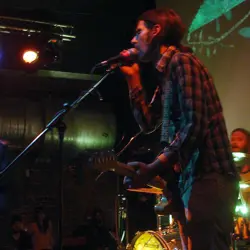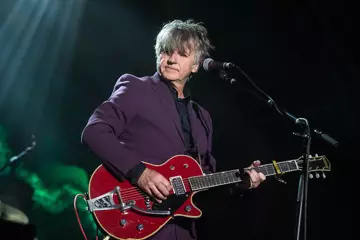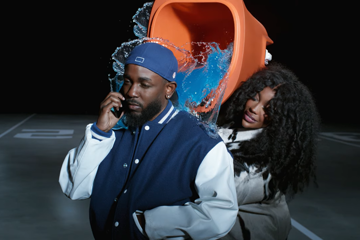 Dead Meadow
Dead MeadowJason Simon stunned many when he embarked upon a solo career. Released in 2010, Simon's self-titled debut album ran completely counter to expectations – a soulful, largely acoustic outing confounding anyone even vaguely familiar with his work as frontman and guitarist for Washington DC psych-rock institution Dead Meadow. It wasn't just the album's stylistic palette that surprised followers, either. It was how comfortable Simon sounded as a folksy singer-songwriter.
“You know, doing that – playing just by myself with an acoustic guitar – actually made me a lot more comfortable as a singer and as a songwriter,” the frontman reflects. “I never sang at all before Dead Meadow. It's really been a whole learning process over the past 13 years. Doing solo stuff really helped me get more comfortable with that. It all comes back to Dead Meadow in the end, anyway. Playing around with other stuff gives you a better idea of what Dead Meadow should do.”
Dead Meadow have simply never been a band to be associated with such stripped-back ideals: their sound has always been absolutely massive. Since their 1998 formation, they've built a global reputation on their enduring affection for vast, '70s-influenced cascades of guitar noise and almost spiritual lyricism. John Peel was a fan and Andrew Stockdale actually reworked one of the band's songs for Wolfmother's second album.
“We definitely had a clear idea of the sound we wanted to work with when we first started out,” Simon says. “You know, coming from Washington DC, we were very much a part of that punk-rock tradition and we all just felt that something different had to happen – both within DC and elsewhere. I remember getting into Black Sabbath and bands like Sleep and having that realisation that you can do something really heavy and loud – but it doesn't necessarily have to be aggressive.
Don't miss a beat with our FREE daily newsletter
“You can almost find a level of relaxation in this heavy drone. Not letting it mellow and still keeping it rocking – but keeping that laidback feel. We definitely wanted to create something that would allow the imagination to wander, so to speak. You know, get stuck into this droning groove and really just let the mind drift. Like I said, I think we always had a pretty clear idea as to the kind of sound we wanted.”
A prime example of the band's sense of scope can be found with their most recent release – 2010's Three Kings. Dead Meadow's only recorded output since 2008's Old Growth album, Three Kings was part film, part album, part live performance and encompassed new recordings, psychedelic film footage and a live concert performance. In short; it was the kind of balls-out Zeppelin-esque creative project that punk-rock was supposed to have killed off decades ago.
“I think Dead Meadow definitely has a spiritual component. I hope it does – it's something we strive for,” Simon muses. “I think with most art, when you're making it, whether you're aware of the ambition or not, you do kind of strive to lose yourself in it and become completely unselfconscious. When you're playing your best or writing your best, you want to forget everything else around you – and, hopefully, that's a kind of experience that gets carried over through to our audience.
“Everything about Three Kings was really driven by that live performance element. You know, we had a lot of stuff going on at once, but it was all sort of driven by that live aspect. Even the new songs were recorded in a really live, stripped-back setting. It's something we've become really conscious of as we've worked on the new record. We've been doing a lot more layering because we didn't really take advantage of the studio at all with Three Kings.”
Except – Dead Meadow have never been quite as single-minded as either their output or reputation would suggest. While respected and appreciated across the globe as purveyors of colossally heavy psychedelic rock, Dead Meadow's catalogue has been attached to a multiplicity of diverse and disparate movements. They've been referred to as stoner-metal, shoegaze, classic rock, indie-rock and psychedelia – discussed in relation to everyone from Black Sabbath to the Flaming Lips.
“It's funny, because while a lot of titles kind of have been slapped onto our name, those titles have kept on changing over the years,” Simon laughs. “When we first came out, we were supposedly the lighter end of the stoner-rock scene and now we're apparently at the heavy end of the psychedelic scene. I don't know. I feel like the names keep changing but I think that's a good thing. While they can group us with like-minded bands, I do feel what we're doing is pretty unique.”
Such is the contradiction of Dead Meadow. The immediate impact of their music is both simple and timeless – but that music is informed by a complex myriad of eclectic musical traditions. Behind their wall-of-sound aesthetics, one can easily detect influences of Hindustani classical music, '60s folk-rock and even strains of late-'90s post-hardcore. Jason Simon's understated vocal delivery owes more to Bob Dylan than anyone else.
“That's actually something I think about every time we make a record,” the vocalist offers. “The only hard thing about keeping the band going is that I do feel there is this edge or this balancing act between stretching out and doing something completely different but also not moving away completely from what Dead Meadow have proven to do very well. You know, with what we do, it's loud, droney rock'n'roll and sometimes it's hard to really explore too many directions with that.
“I think that was the good thing about doing the solo stuff because it opened up a couple of different directions and kind of gave a new context to what we do in Dead Meadow. It was a bit like, 'Oh, cool, so, it can be good sometimes to pull it back down to a quieter level or go in that direction'. We do worry about repeating ourselves. I've always thought that, if we did ever try and consciously replicate anything in our catalogue, it'd just end up sounding worse, anyway.”
It's a strange kink of contradiction that seems to runs throughout the band's entire career – from their incongruous appearances on The Wire (series co-creator David Simon being Jason's uncle) to their strangely cyclical career arc. Their forthcoming sixth studio album, for example, will feature original drummer Mark Laughlin (who re-joined the band in 2010 after an eight-year absence). As they approach nearly 15 years, Dead Meadow have actually returned to their original line-up.
“Life is good. We're putting songs together for this next record. We've already got a whole bunch of stuff recorded but, because we've got our own studio space, we've kind of been taking our time – leisurely doing this record,” Simon laughs. “I guess we've been working on it for around eight months. We kind of had some ideas before Mark re-joined the band but, since he's been back, we've been doing a lot of touring and that's kind of broken it up too. It feels really special, though.”















